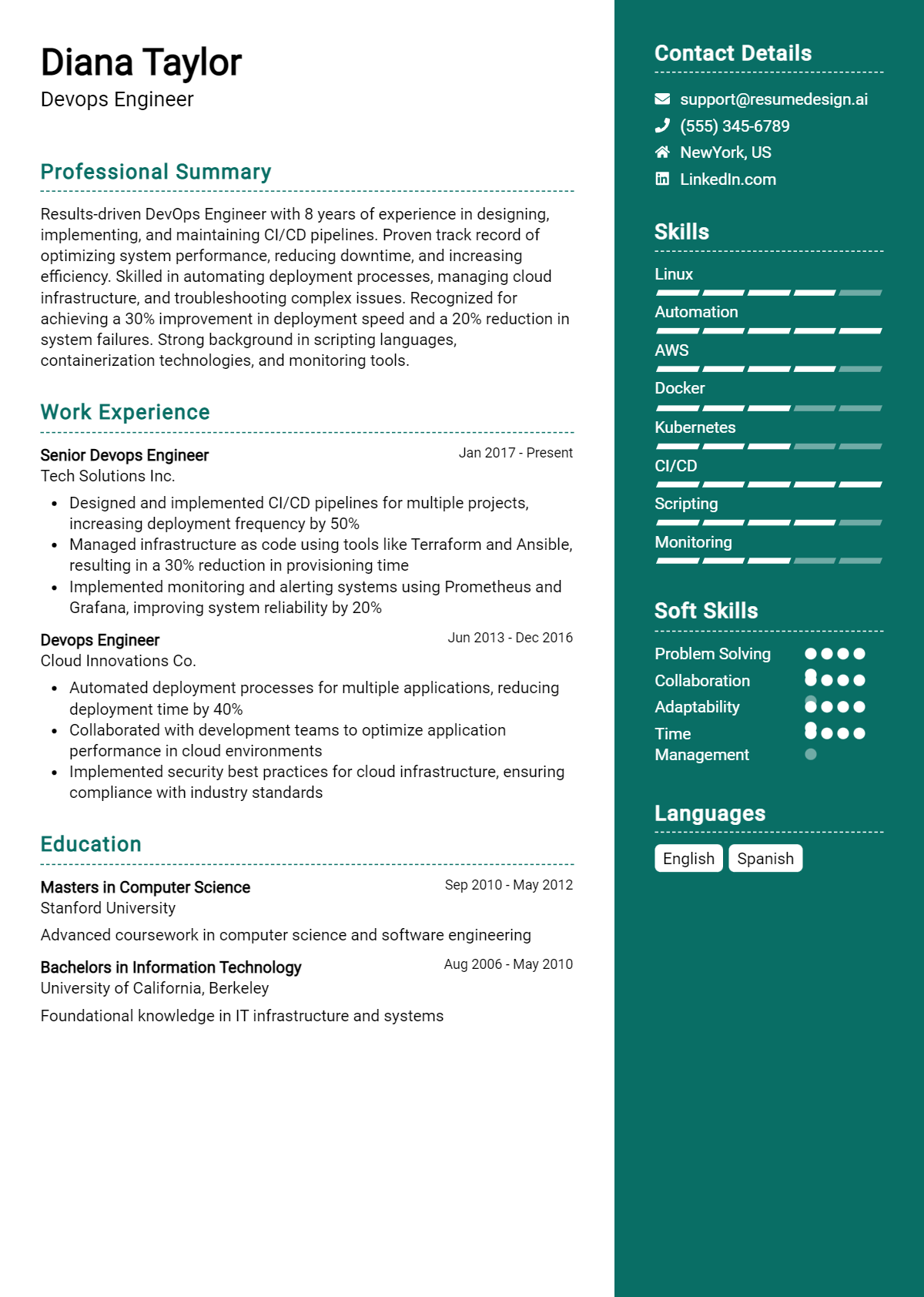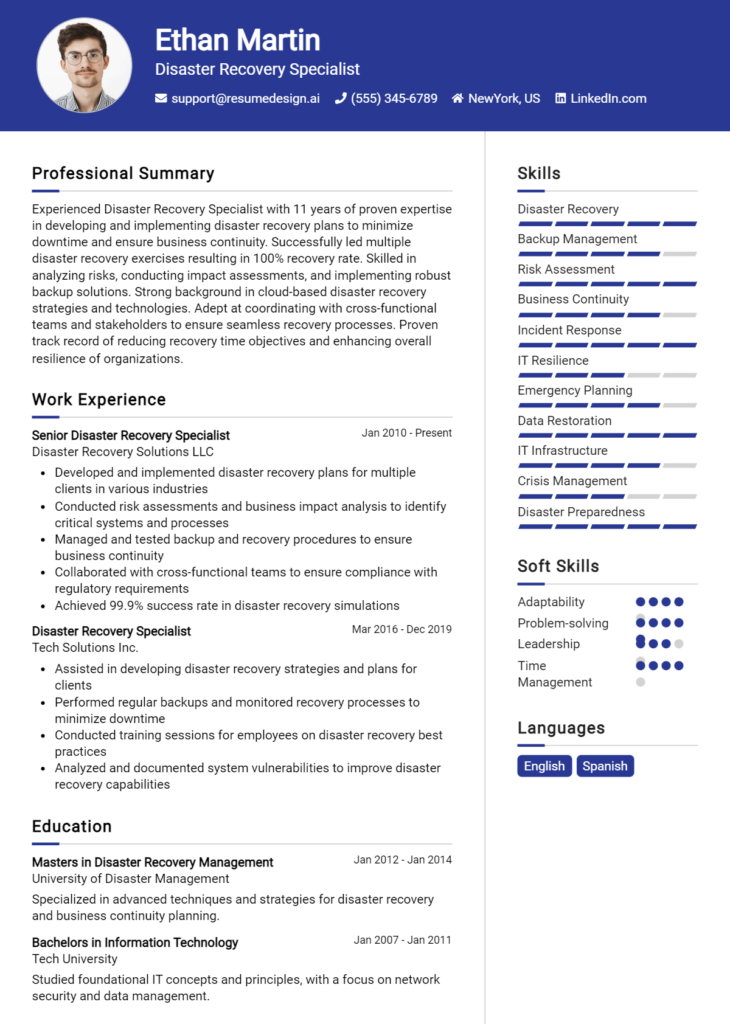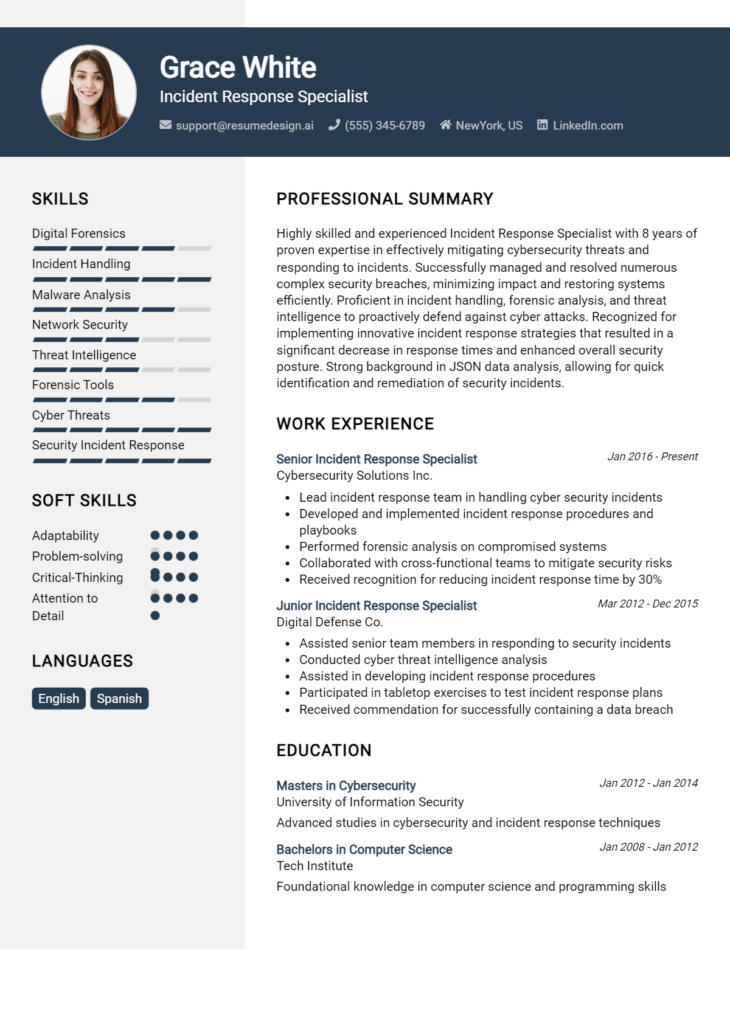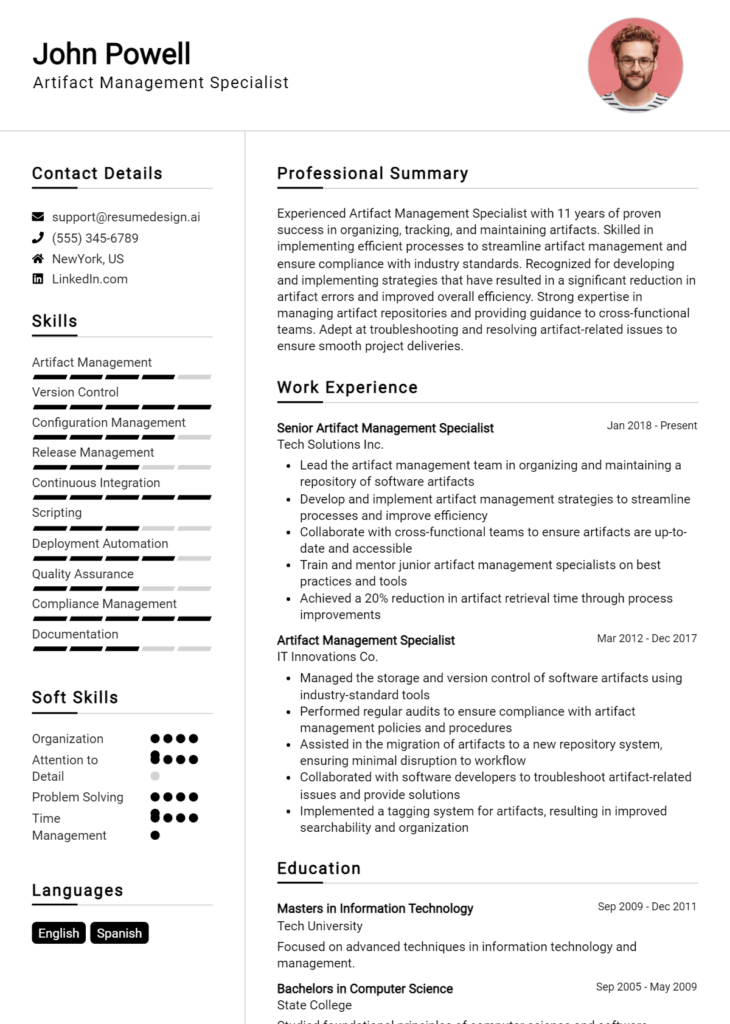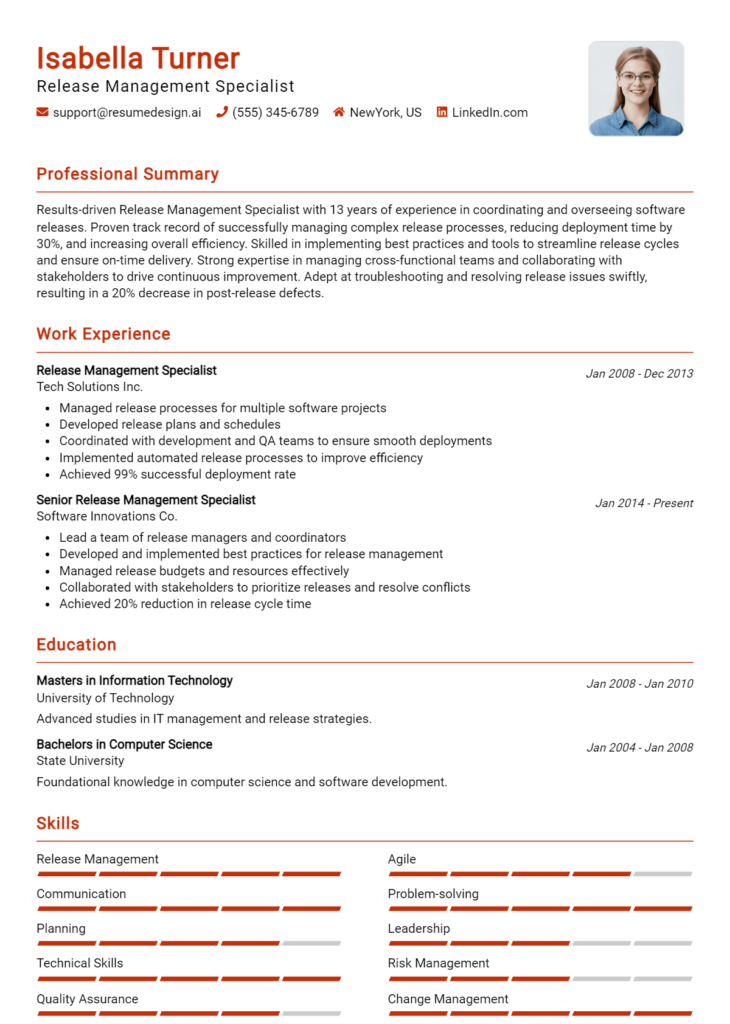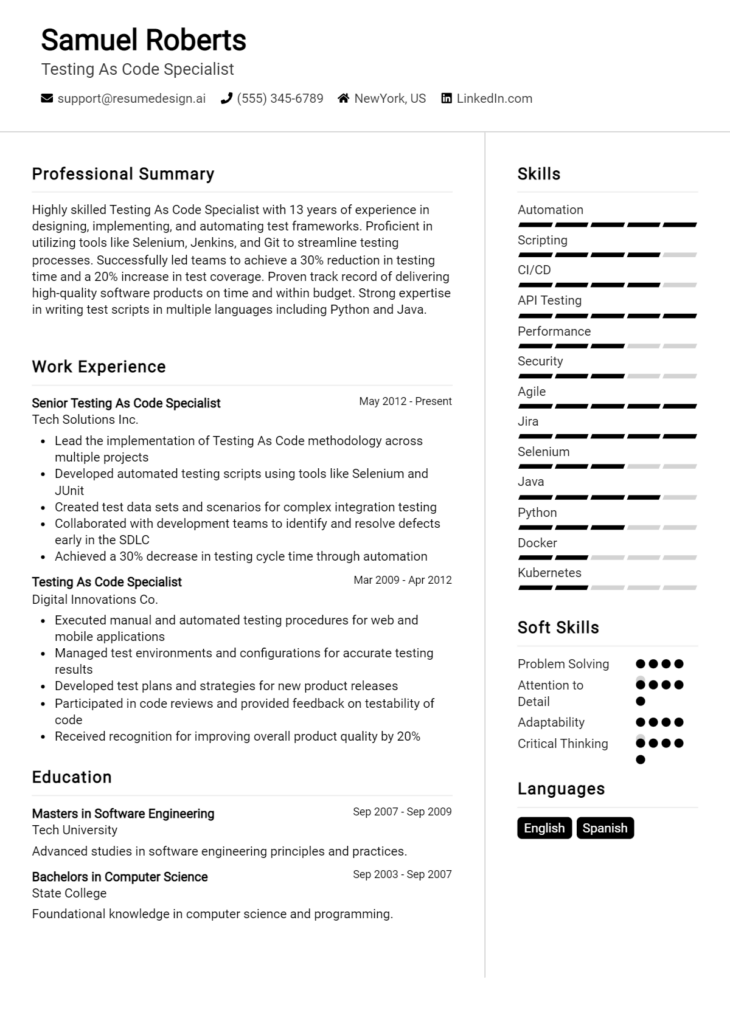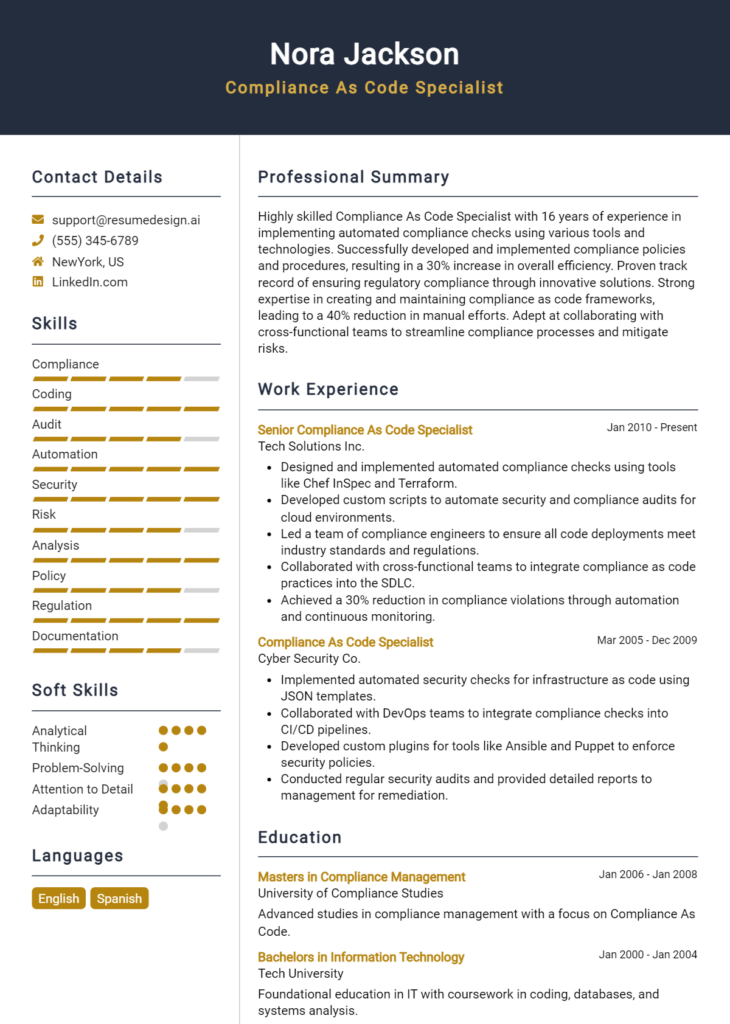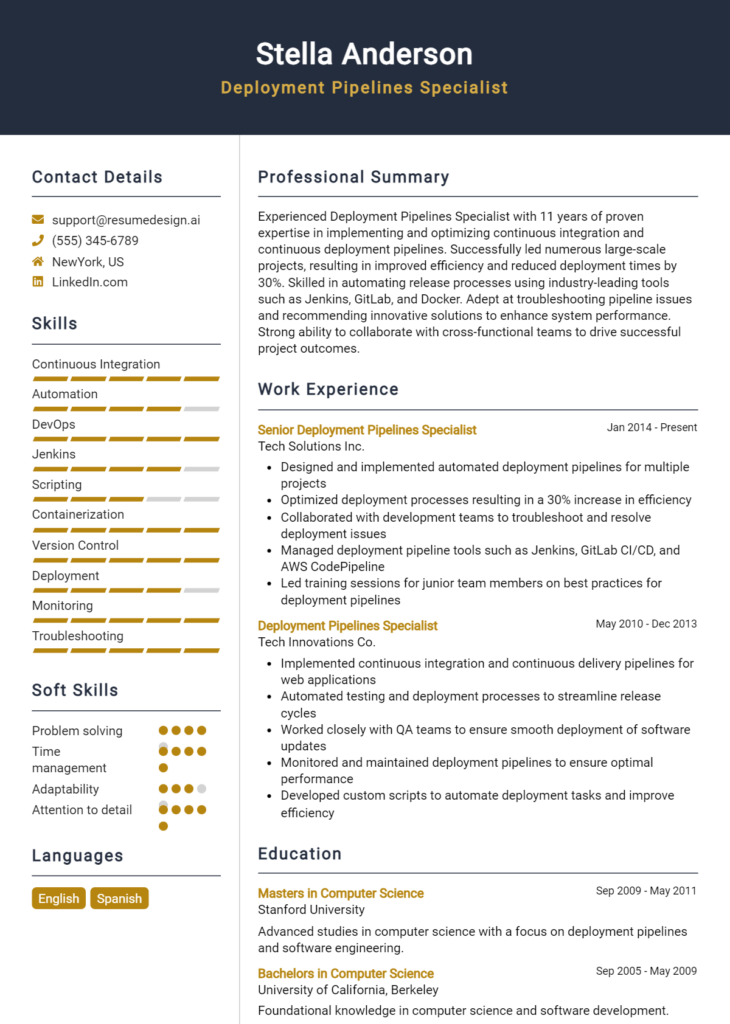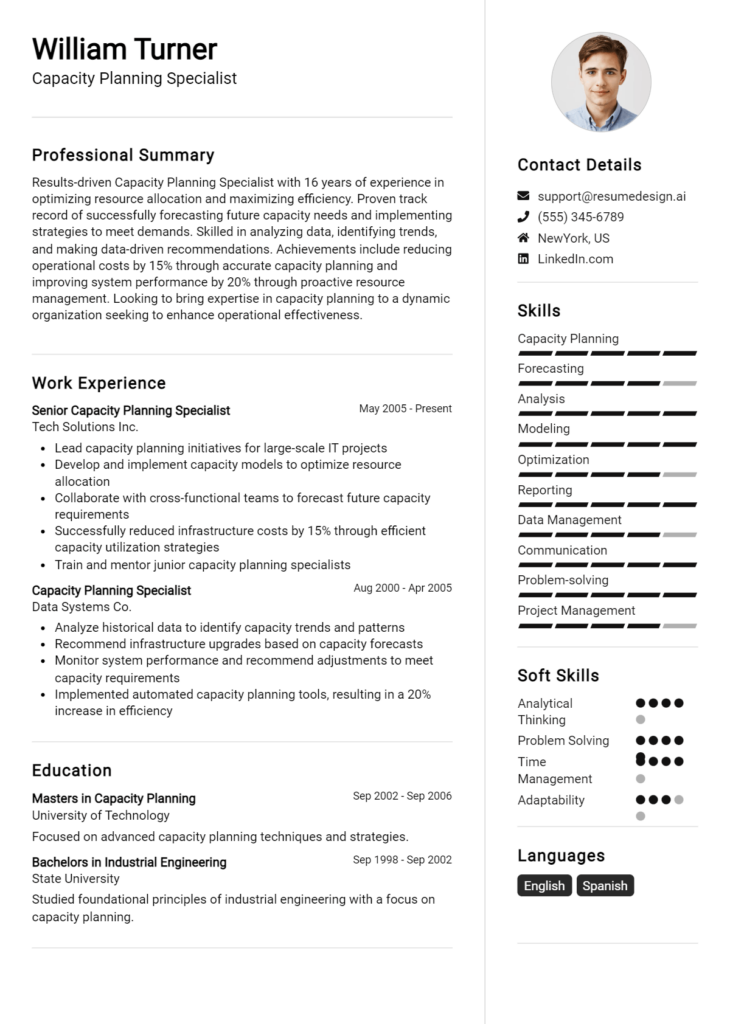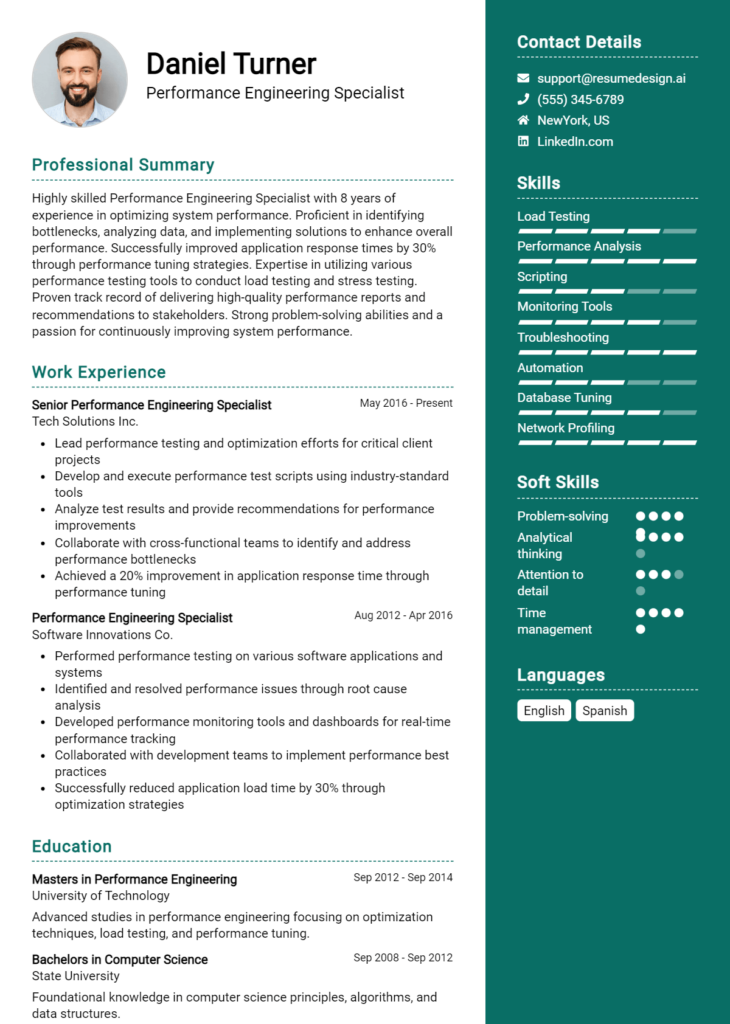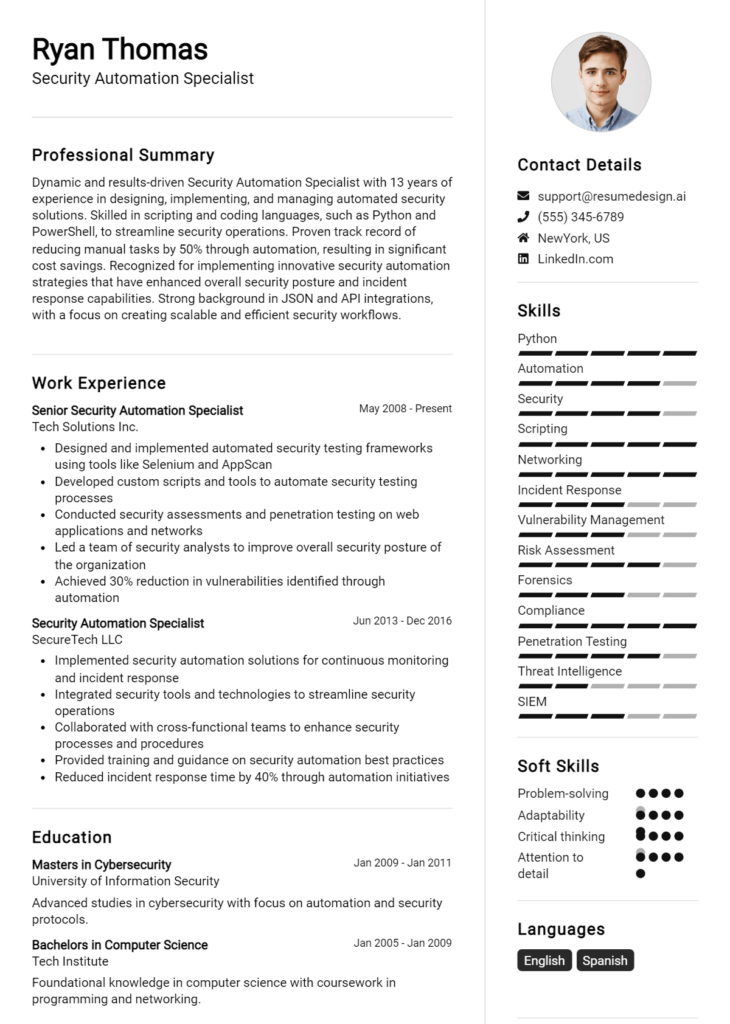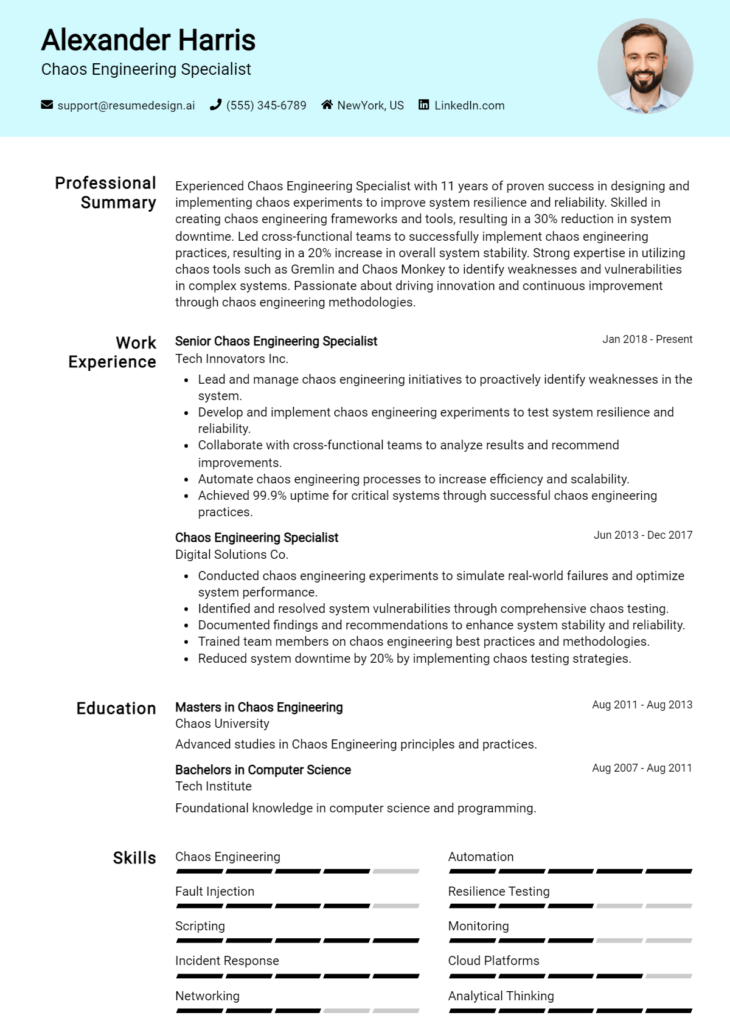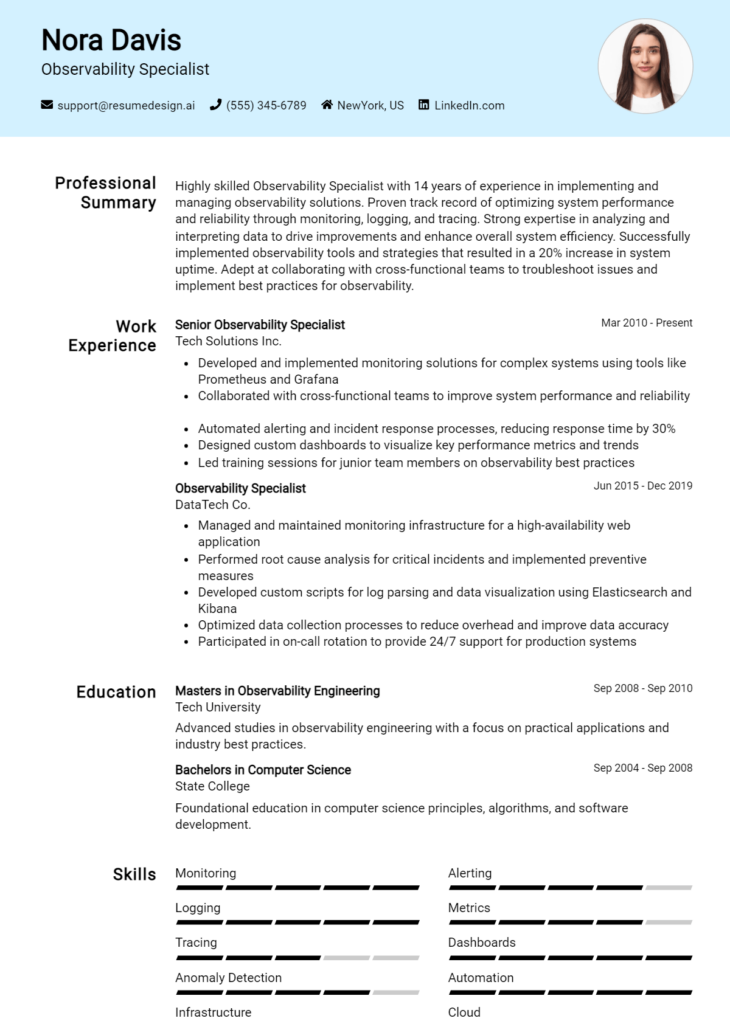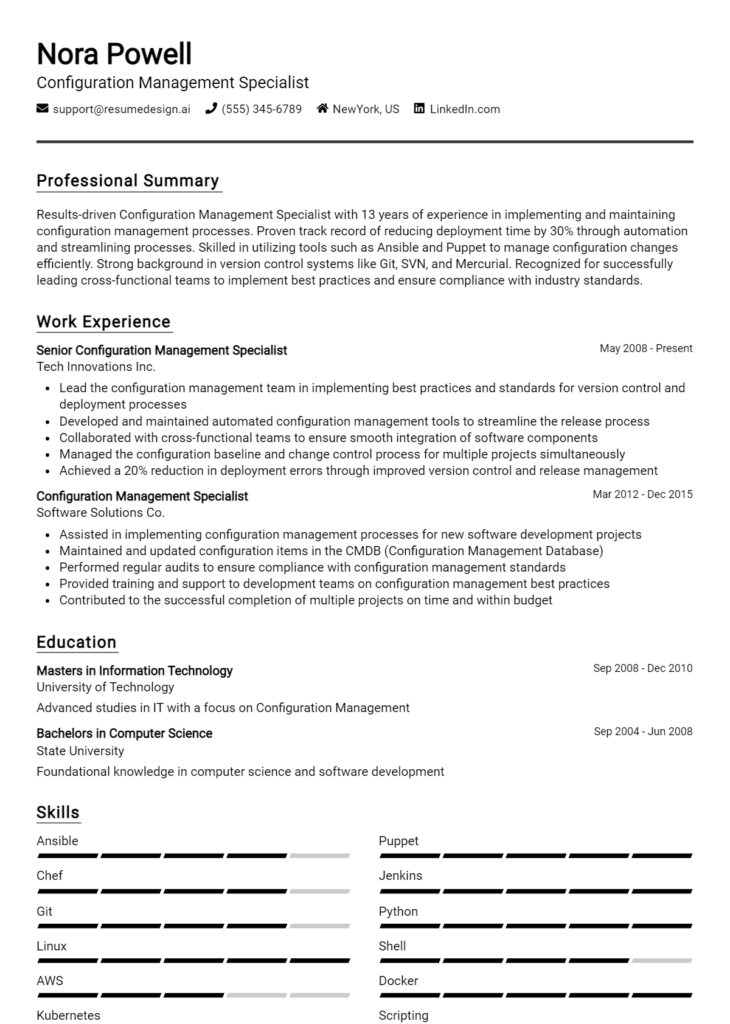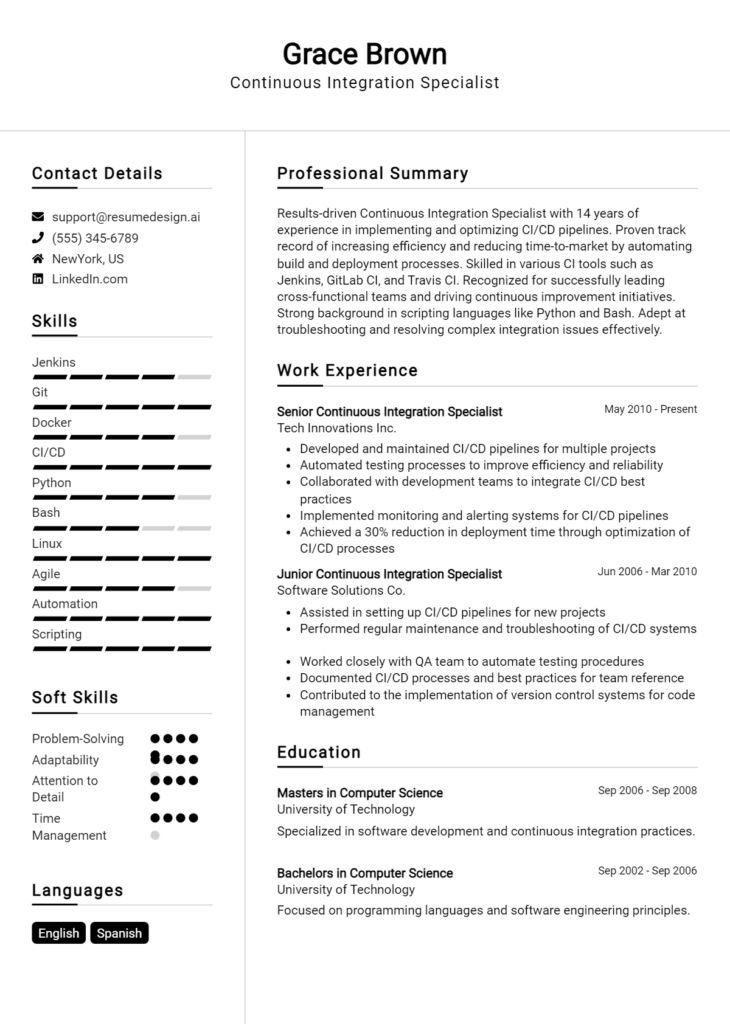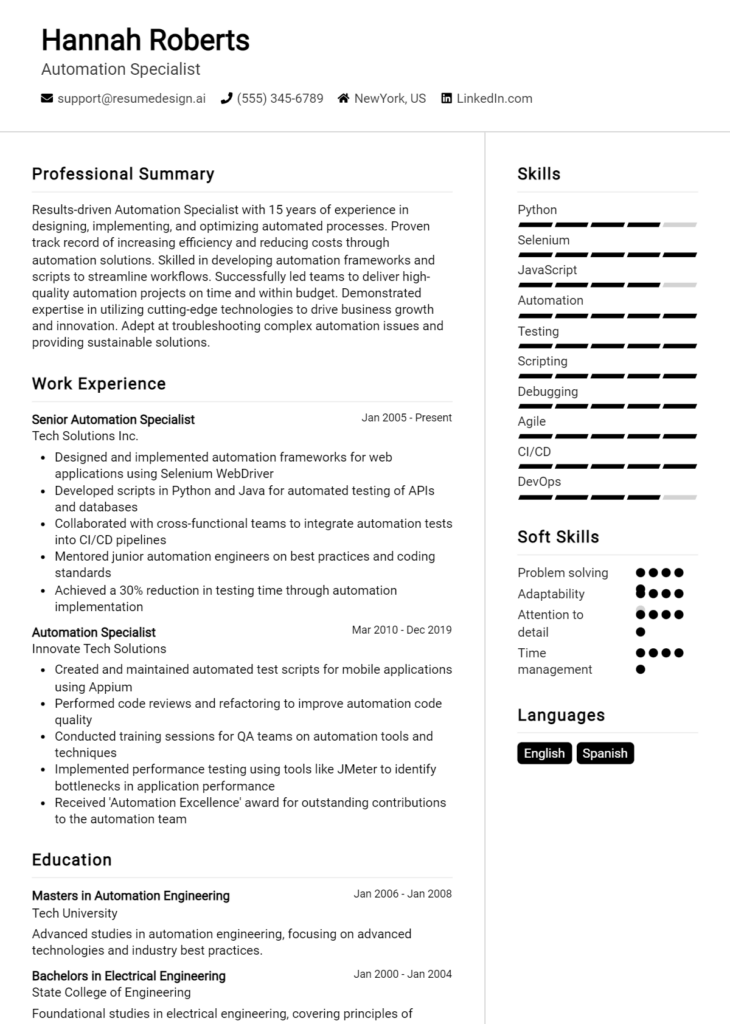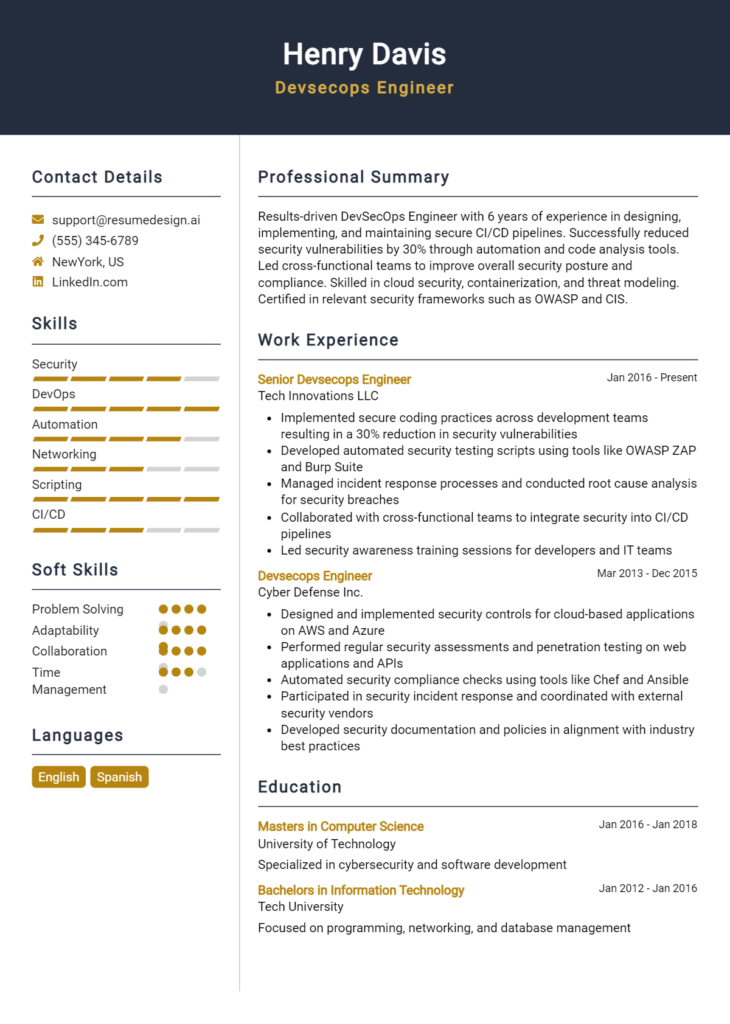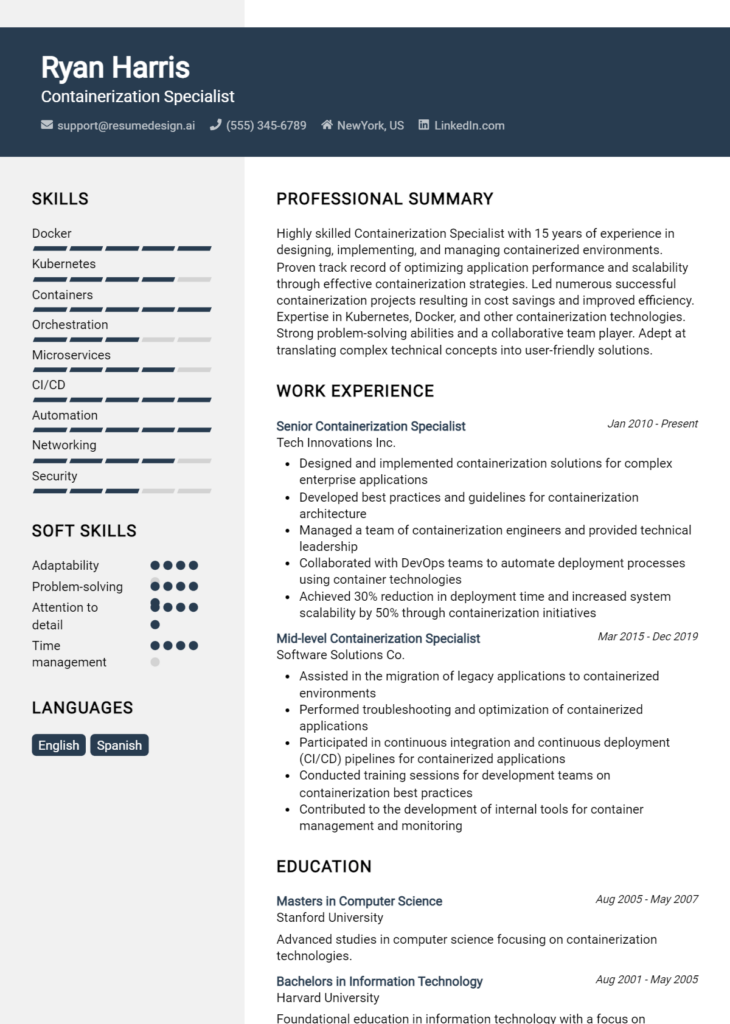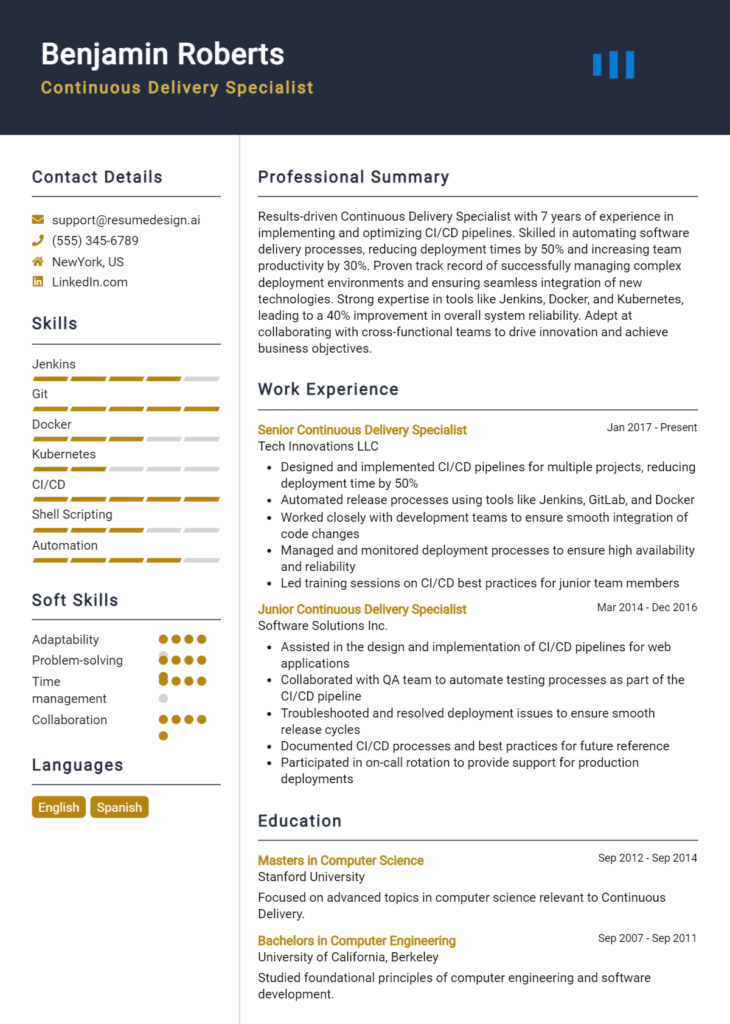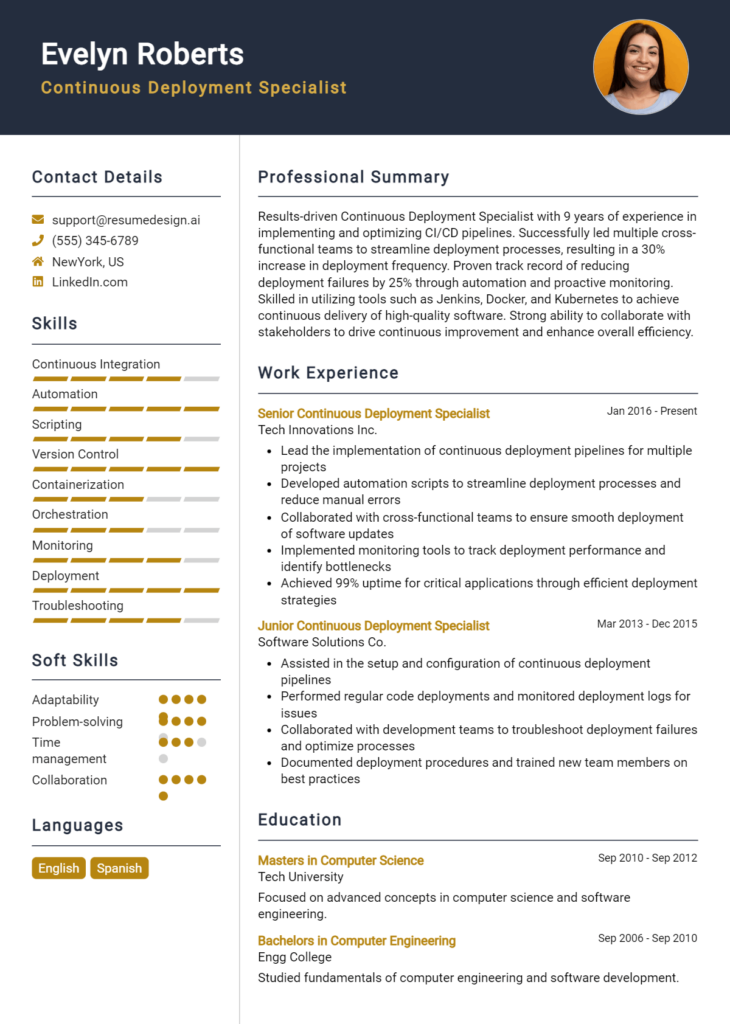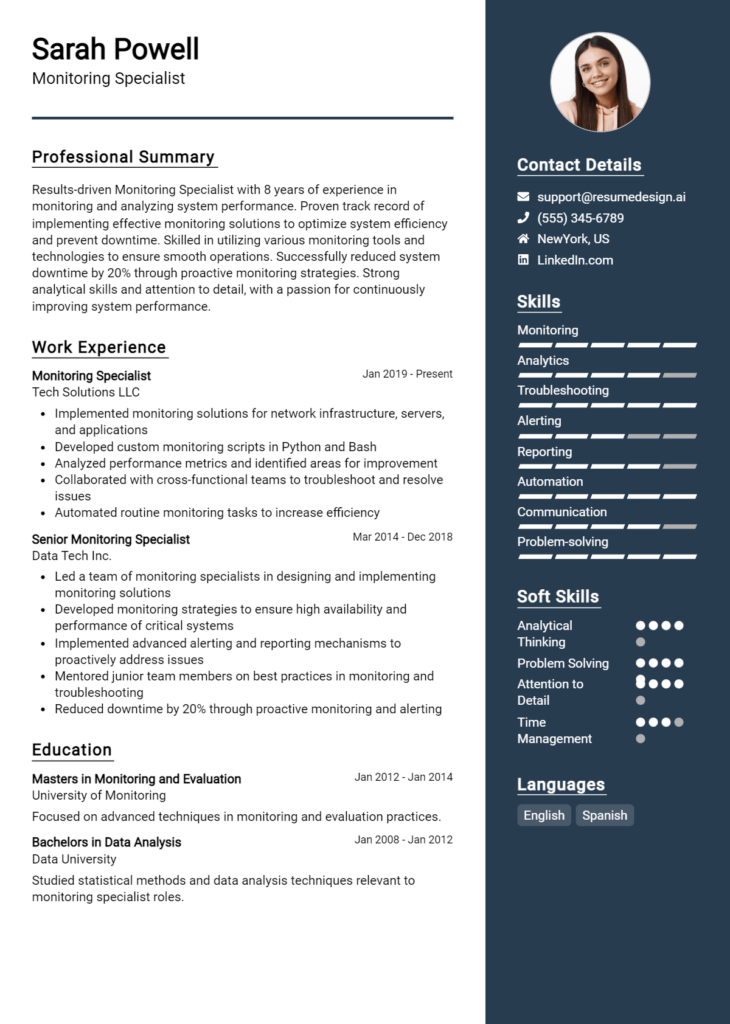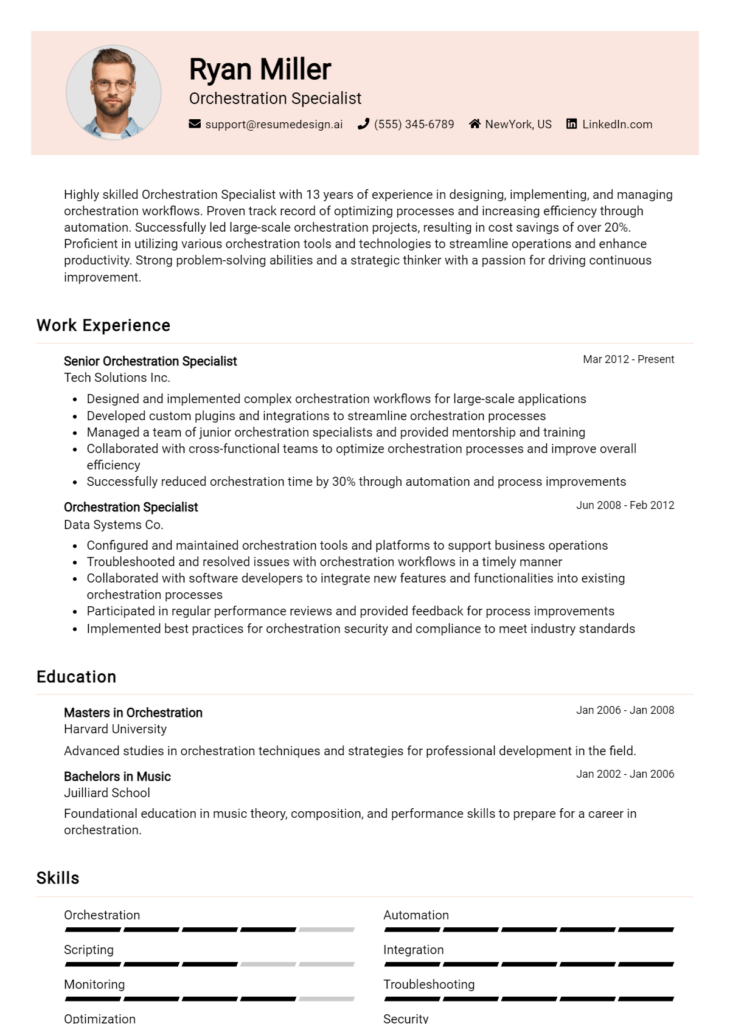DevOps Engineer Core Responsibilities
A DevOps Engineer plays a crucial role in bridging the gap between development and operations teams, ensuring streamlined software delivery and infrastructure management. Key responsibilities include automating deployment processes, monitoring system performance, and implementing continuous integration and continuous deployment (CI/CD) pipelines. Essential skills encompass technical proficiency in cloud services, scripting languages, and containerization tools, alongside strong problem-solving abilities. These competencies contribute significantly to organizational efficiency, and a well-structured resume can effectively highlight these qualifications to potential employers.
Common Responsibilities Listed on DevOps Engineer Resume
- Automating deployment processes using CI/CD pipelines.
- Managing cloud infrastructure and services.
- Monitoring system performance and troubleshooting issues.
- Collaborating with development and operations teams.
- Implementing configuration management tools.
- Ensuring security best practices in deployments.
- Conducting system backups and disaster recovery planning.
- Optimizing application performance and reliability.
- Documenting processes and systems for knowledge sharing.
- Facilitating agile methodologies within project teams.
- Managing container orchestration using platforms like Kubernetes.
High-Level Resume Tips for DevOps Engineer Professionals
A well-crafted resume is crucial for DevOps Engineer professionals as it serves as the first impression a candidate makes on potential employers. In a highly competitive job market, your resume needs to reflect not only your technical skills but also your achievements and contributions to past projects. It should tell a compelling story of your career journey, showcasing your proficiency in both development and operations. This guide will provide practical and actionable resume tips specifically tailored for DevOps Engineer professionals, helping you to stand out and make a lasting impact.
Top Resume Tips for DevOps Engineer Professionals
- Tailor your resume to the job description by using relevant keywords and phrases that match the specific skills and requirements outlined in the posting.
- Highlight your relevant experience by focusing on roles and projects that showcase your DevOps skills, such as automation, CI/CD pipelines, and cloud services.
- Quantify your achievements by providing specific metrics, such as percentage improvements, cost savings, or time reductions resulting from your initiatives.
- Showcase your proficiency with industry-specific tools and technologies, such as Docker, Kubernetes, Jenkins, and AWS, to demonstrate your technical expertise.
- Include certifications relevant to DevOps, such as AWS Certified DevOps Engineer or Certified Kubernetes Administrator, to enhance your credibility.
- Incorporate soft skills like collaboration, problem-solving, and communication, as these are critical in cross-functional DevOps environments.
- Use action verbs to describe your responsibilities and accomplishments, making your contributions sound dynamic and impactful.
- Keep the format clean and professional, using bullet points for easy readability and ensuring that the document is free from grammatical errors.
- Consider adding a summary statement at the beginning of your resume that encapsulates your experience and skills, tailored to the DevOps field.
By implementing these tips, you can significantly increase your chances of landing a job in the DevOps Engineer field. A well-structured and tailored resume not only highlights your capabilities but also demonstrates your understanding of the role, making you an attractive candidate to potential employers.
Why Resume Headlines & Titles are Important for DevOps Engineer
In the competitive landscape of job applications, a well-crafted resume headline or title is crucial for a DevOps Engineer. It serves as the first point of contact between the candidate and hiring managers, thus carrying immense weight in grabbing attention. A strong headline succinctly summarizes the candidate's key qualifications, skills, and areas of expertise in just a few impactful words. This concise statement should be directly relevant to the position being applied for, allowing the candidate to immediately communicate their value proposition and align with the needs of the employer.
Best Practices for Crafting Resume Headlines for DevOps Engineer
- Keep it concise: Aim for a headline that is brief and to the point, ideally no more than 10 words.
- Be role-specific: Tailor the headline to reflect the specific DevOps Engineer position you are targeting.
- Highlight key skills: Include essential skills or certifications that set you apart from other candidates.
- Use action-oriented language: Start with strong action verbs to convey a sense of achievement and capability.
- Incorporate industry keywords: Use relevant terms that are commonly found in job descriptions to pass through Applicant Tracking Systems (ATS).
- Avoid clichés: Steer clear of overused phrases that do not add value to your resume.
- Showcase accomplishments: If applicable, mention notable achievements or results that demonstrate your impact in previous roles.
- Reflect your personal brand: Ensure that the tone and style of your headline align with your professional identity.
Example Resume Headlines for DevOps Engineer
Strong Resume Headlines
DevOps Engineer | CI/CD Expert | Cloud Infrastructure Specialist
Results-Driven DevOps Engineer with 5 Years in Automation
Certified Kubernetes Administrator | Agile DevOps Practitioner
DevOps Engineer Focused on Performance Optimization & Cost Reduction
Weak Resume Headlines
DevOps Engineer with Experience
IT Professional Seeking Opportunities
Strong headlines are effective because they are specific, highlight relevant skills, and convey a clear sense of the candidate's expertise and accomplishments. They immediately communicate the candidate's value, making it easy for hiring managers to see why they should consider the applicant for the role. In contrast, weak headlines fail to impress due to their vagueness and lack of detail, leaving hiring managers with little understanding of the candidate's qualifications or unique selling points. A captivating headline sets the tone for the rest of the resume, encouraging further reading and consideration.
Writing an Exceptional DevOps Engineer Resume Summary
A well-crafted resume summary is a critical component for a DevOps Engineer, as it serves as the first impression for hiring managers. In a competitive job market, a strong summary quickly captures attention by showcasing the candidate's key skills, relevant experience, and notable accomplishments in a concise manner. It allows candidates to highlight their value proposition and make a compelling case for why they are the ideal fit for the role. A tailored resume summary can set the tone for the entire application, emphasizing alignment with the specific job requirements and demonstrating the candidate's commitment to contributing to the organization's success.
Best Practices for Writing a DevOps Engineer Resume Summary
- Quantify Achievements: Use specific numbers and metrics to demonstrate your impact, such as reduced deployment time by 30%.
- Focus on Relevant Skills: Highlight key technical skills and tools that are pertinent to the DevOps role, such as AWS, Docker, and CI/CD pipelines.
- Tailor the Summary: Customize your summary for each job application to reflect the specific requirements and keywords from the job description.
- Keep it Concise: Aim for 2-4 sentences that encapsulate your qualifications without overwhelming the reader.
- Showcase Problem-Solving Abilities: Mention specific challenges you have addressed in previous roles and the solutions you implemented.
- Highlight Collaboration: Emphasize your experience working in cross-functional teams, as DevOps often requires collaboration between development and operations.
- Use Action-Oriented Language: Start with strong action verbs that convey your proactive contributions, such as "implemented," "optimized," or "accelerated."
- Reflect Industry Knowledge: Include any relevant certifications or knowledge of industry best practices that may set you apart from other candidates.
Example DevOps Engineer Resume Summaries
Strong Resume Summaries
Results-driven DevOps Engineer with over 5 years of experience in automating deployment pipelines and improving operational efficiency. Successfully reduced application deployment time by 40% through the implementation of CI/CD practices and cloud infrastructure using AWS.
Dynamic DevOps professional skilled in containerization and orchestration, with expertise in Docker and Kubernetes. Led a cross-functional team to streamline DevOps processes, resulting in a 25% decrease in production incidents and enhanced system reliability.
Detail-oriented DevOps Engineer with a proven track record of optimizing cloud environments and enhancing system performance. Spearheaded a project that reduced infrastructure costs by 20% while increasing application uptime to 99.9% through effective monitoring and automation strategies.
Weak Resume Summaries
DevOps Engineer with experience in various technologies looking for a new opportunity.
An enthusiastic IT professional interested in DevOps roles. Skilled in some tools and looking to grow further.
The strong resume summaries are considered effective because they provide specific metrics and accomplishments that highlight the candidate's skills and contributions to previous roles. They are tailored to the DevOps position, showcasing relevant expertise and a clear understanding of the impact made in past projects. In contrast, the weak summaries are vague and lack quantifiable results, making it difficult for hiring managers to gauge the candidate's true capabilities and fit for the role.
Work Experience Section for DevOps Engineer Resume
The work experience section of a DevOps Engineer resume holds significant importance as it serves as a critical showcase of the candidate's technical skills and capabilities in handling complex projects. This section provides potential employers with insight into the applicant's ability to manage teams effectively, navigate challenges, and deliver high-quality products consistently. By quantifying achievements and aligning experiences with industry standards, candidates can demonstrate their value and relevance in the competitive field of DevOps, making a compelling case for their candidacy.
Best Practices for DevOps Engineer Work Experience
- Highlight technical skills relevant to DevOps such as CI/CD, cloud platforms, and automation tools.
- Quantify accomplishments using metrics (e.g., reduced deployment times by 30% or improved system uptime to 99.9%).
- Emphasize collaboration and teamwork, showcasing how you worked with cross-functional teams.
- Use action verbs to convey a sense of proactivity and leadership in your roles.
- Tailor your experience to align with the job description and industry standards.
- Include specific technologies and tools used, demonstrating your hands-on experience.
- Focus on outcomes and the impact of your contributions on the organization.
- Keep descriptions concise and focused on relevant experiences that showcase your strengths.
Example Work Experiences for DevOps Engineer
Strong Experiences
- Led a team of 5 engineers to implement a CI/CD pipeline that reduced deployment times by 40%, resulting in faster product releases.
- Architected a cloud infrastructure solution on AWS that improved system scalability and reduced costs by 25% over the previous year.
- Collaborated with development and QA teams to automate testing processes, achieving a 50% reduction in manual testing time.
- Introduced containerization using Docker and Kubernetes, streamlining development workflows and enhancing application reliability.
Weak Experiences
- Worked on various projects related to DevOps tasks.
- Assisted in managing servers and performing updates.
- Participated in team meetings and contributed ideas.
- Helped with deployment processes without specifying tools or methods.
The examples of strong experiences are considered as such because they provide clear, quantifiable results that demonstrate the candidate's impact on the organization, showcasing technical leadership and collaboration. In contrast, the weak experiences lack specificity, metrics, and actionable details, making them less compelling and harder to evaluate against industry standards.
Education and Certifications Section for DevOps Engineer Resume
The education and certifications section of a DevOps Engineer resume is crucial in establishing a candidate's credibility and expertise in the field. This section not only showcases the candidate's academic background but also highlights industry-relevant certifications and continuous learning efforts that are essential in the ever-evolving tech landscape. Providing details about relevant coursework, certifications, and any specialized training can significantly enhance the candidate's alignment with the job role, demonstrating a commitment to professional growth and the ability to adapt to new technologies and methodologies.
Best Practices for DevOps Engineer Education and Certifications
- Include only relevant degrees and certifications related to DevOps practices and tools.
- Detail specific coursework that aligns with DevOps methodologies, such as cloud computing, automation, and CI/CD.
- Highlight industry-recognized certifications from reputable organizations, such as AWS, Microsoft, or Google.
- List certifications in order of relevance or recency to emphasize your current expertise.
- Include any specialized training or workshops that reflect hands-on experience with DevOps tools.
- Consider adding dates to show your continuous learning journey and to indicate how recently you've updated your skills.
- Use clear and concise language to convey information efficiently, avoiding unnecessary jargon.
- Tailor the section to match the job description, emphasizing qualifications that are most relevant to the role you are applying for.
Example Education and Certifications for DevOps Engineer
Strong Examples
- Bachelor of Science in Computer Science, University of Technology, Graduated May 2021
- AWS Certified DevOps Engineer – Professional, Obtained August 2023
- Google Cloud Professional DevOps Engineer Certification, Obtained January 2023
- Coursework in Continuous Integration and Deployment, Agile Methodologies, and Cloud Architecture
Weak Examples
- Associate Degree in General Studies, Community College, Graduated May 2019
- Certified Microsoft Office Specialist, Obtained June 2018
- Online Course in Basic HTML and CSS, Completed March 2020
- High School Diploma, Completed June 2015
The strong examples listed above are considered relevant and impactful as they directly align with the skills and knowledge required for a DevOps Engineer role, showcasing both educational qualifications and industry-recognized certifications. In contrast, the weak examples lack relevance to the DevOps field, featuring outdated or generalized certifications that do not demonstrate a commitment to the necessary skills and practices associated with modern DevOps engineering.
Top Skills & Keywords for DevOps Engineer Resume
In the fast-evolving landscape of technology, the role of a DevOps Engineer is pivotal in bridging the gap between development and operations teams. A well-crafted resume is essential for showcasing the unique combination of skills that define a successful DevOps professional. Highlighting both hard and soft skills not only reflects your technical proficiency but also underscores your ability to collaborate, communicate, and adapt in a dynamic environment. As you prepare your resume, focusing on these skills will help you stand out to potential employers and demonstrate your readiness to contribute to their teams.
Top Hard & Soft Skills for DevOps Engineer
Soft Skills
- Strong communication skills
- Team collaboration
- Problem-solving mindset
- Adaptability
- Critical thinking
- Time management
- Attention to detail
- Conflict resolution
- Leadership abilities
- Creativity
Hard Skills
- Proficiency in cloud platforms (AWS, Azure, GCP)
- Experience with CI/CD tools (Jenkins, GitLab CI)
- Scripting languages (Python, Bash, Ruby)
- Containerization (Docker, Kubernetes)
- Configuration management tools (Ansible, Puppet, Chef)
- Monitoring and logging tools (Prometheus, ELK Stack)
- Version control systems (Git, SVN)
- Infrastructure as Code (Terraform, CloudFormation)
- Networking fundamentals
- Database management (SQL, NoSQL)
By emphasizing these skills in your resume, along with relevant work experience, you'll be better positioned to capture the attention of hiring managers and demonstrate your value as a DevOps Engineer.
Stand Out with a Winning DevOps Engineer Cover Letter
I am writing to express my interest in the DevOps Engineer position at [Company Name]. With a solid background in software development and system administration, combined with my passion for automation and continuous improvement, I am excited about the opportunity to contribute to your team. My experience in deploying and managing cloud-based applications, along with my proficiency in CI/CD pipelines, positions me as a strong candidate for this role.
In my previous role at [Previous Company Name], I successfully led a team in implementing a robust CI/CD pipeline that reduced deployment times by 40% while increasing overall system reliability. I have hands-on experience with tools such as Jenkins, Docker, and Kubernetes, which have been essential in streamlining our development processes. Additionally, my knowledge of cloud platforms like AWS and Azure has allowed me to optimize resource allocation and reduce costs, ensuring our applications ran efficiently and effectively.
Collaboration is at the core of successful DevOps practices, and I pride myself on my ability to work closely with development and operations teams. I have fostered a culture of open communication and shared responsibility, which has led to improved workflows and faster resolution of issues. My commitment to continuous learning and adaptation to new technologies ensures that I stay ahead of industry trends, enabling me to bring innovative solutions to the table.
I am excited about the possibility of joining [Company Name] and contributing to your mission of delivering high-quality software solutions. I am confident that my technical expertise and collaborative mindset will make a positive impact on your team. Thank you for considering my application. I look forward to the opportunity to discuss how I can help drive your DevOps initiatives forward.
Common Mistakes to Avoid in a DevOps Engineer Resume
When crafting a resume for a DevOps Engineer position, it's crucial to present your skills and experiences effectively. However, many candidates fall into common pitfalls that can undermine their chances of landing an interview. Understanding these mistakes can help you refine your resume and showcase your qualifications in the best light. Here are some common mistakes to avoid:
Lack of Specificity: Failing to provide specific details about your projects and achievements can make your resume feel generic. Instead, quantify your accomplishments with metrics and results, such as "reduced deployment time by 30%."
Ignoring Relevant Skills: Omitting key DevOps tools and technologies that you are proficient in can weaken your application. Ensure that you highlight relevant skills like Docker, Kubernetes, CI/CD pipelines, and cloud platforms.
Using Jargon Without Context: While industry jargon can demonstrate familiarity, overusing it without context may alienate hiring managers who are not as technically inclined. Aim for clarity and balance.
Overloading with Technical Details: Including excessive technical details can confuse the reader. Focus on the most relevant information that aligns with the job description instead of listing every tool or technology you've encountered.
Neglecting Soft Skills: Many DevOps roles require strong collaboration and communication skills. Failing to mention these soft skills can give an incomplete view of your capabilities. Highlight experiences where you successfully worked in teams or led projects.
Using a One-Size-Fits-All Approach: Submitting a generic resume for multiple positions can hurt your chances. Tailor your resume to each job application by aligning your experiences with the specific requirements and responsibilities outlined in the job description.
Poor Formatting and Structure: A cluttered or overly complex resume can distract from your content. Use clear headings, bullet points, and consistent formatting to enhance readability and make it easy for recruiters to find key information.
Not Including Continuous Learning: In the fast-evolving tech landscape, continuous learning is vital. Failing to mention certifications, courses, or workshops that are relevant to DevOps can make your resume seem outdated. Always include recent learning experiences to demonstrate your commitment to growth.
Conclusion
As we conclude our exploration of the pivotal role of a DevOps Engineer, it's essential to reflect on the key skills and attributes that define success in this dynamic field. From an in-depth understanding of CI/CD pipelines to expertise in automation tools and cloud services, the demand for proficient DevOps Engineers continues to grow. Moreover, effective collaboration and communication skills are critical, as DevOps practices emphasize breaking down silos between development and operations teams.
To ensure you stand out in this competitive job market, it's crucial to have a polished and well-structured resume that highlights your relevant experience and skills. We encourage you to take a moment to review your DevOps Engineer resume, ensuring it effectively conveys your qualifications and aligns with industry expectations.
To assist you in this process, a variety of resources are available to help you create an impactful resume and cover letter. Explore our collection of resume templates to find a style that suits your professional brand. Utilize the resume builder for a user-friendly approach to crafting your resume. Additionally, check out our resume examples for inspiration from successful DevOps professionals. Don’t forget to enhance your application with our customizable cover letter templates.
Take the next step in your career by refining your resume today!

